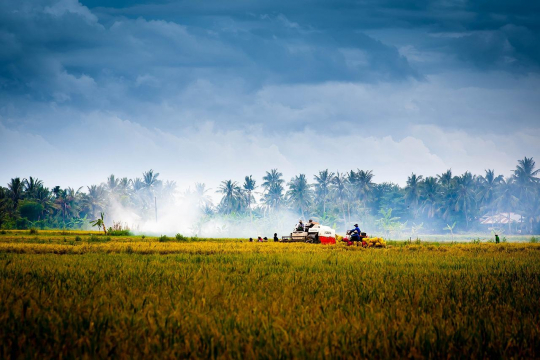Scale economies present an advantage of reducing cost when producing at a large level of output, while scope economies refer to the advantage of better utilizing resources when combining producing a number of crops on the same land area. In the case of Vietnam, is crop diversification or specialization better for small farms, in terms of efficiency and productivity?
A recent study titled ‘Scale and scope economies in small household rice farming in Vietnam’ by Viet-Ngu Hoang, Trung Thanh Nguyen, Clevo Wilson, Thong Quoc Ho, and Uttam Khanal explored the suitability of crop diversification and specialization in Vietnam’s smallholding agriculture context.
Vietnam’s agricultural sector is moving towards industrialized large-scale production, but it remains dominated by smallholder farmers. Following a long tradition of rice cultivation and past policies that prioritized rice as the main staple food, the sector is now moving in the direction of diversifying to high-value crops. Although the diversification process has been slow in Vietnam, the country still provides a good case for studying the effects of specialization and diversification on efficiency and productivity for small household farming. This research investigated 925 households in Hue and Ha Tinh to answer the research question.
Both scale and scope economies were found
Empirical findings from the study proved that all surveyed households operate with increasing return to scale, suggesting there are product-specific economies of scale. This finding implies that farmers can achieve higher efficiency by producing a higher volume of each individual crop. Meanwhile, economies of scope are found in 894 out of 925 surveyed households, indicating the complementarity effects of joint production of multiple crops on a farm. In other words, farmers can also increase efficiency by diversifying their cultivation portfolio.
Different strategies fit different regions
This research shows differences in the level of cost-reducing advantage across households in coastal, delta, and mountainous regions. Economies of scale in rice are higher in delta districts, while that degree for vegetables and other annual crops is higher in mountainous areas. However, households in mountainous regions operate at higher economies of scope for all rice, vegetables, and annual crops than delta and coastal households. Therefore, policy design should take into account the efficiency differences across regions. For delta and coastal regions where there is evidence of higher scale economies, farmers are better off specializing in one or a few crop types, so specialization should be promoted to farmers to attain scale economies. For a mountainous household with higher scope economies, it is better to integrate rice-vegetable-annual crops, so diversification should be promoted to those farmers.
By Khanh-Minh Le Anh
